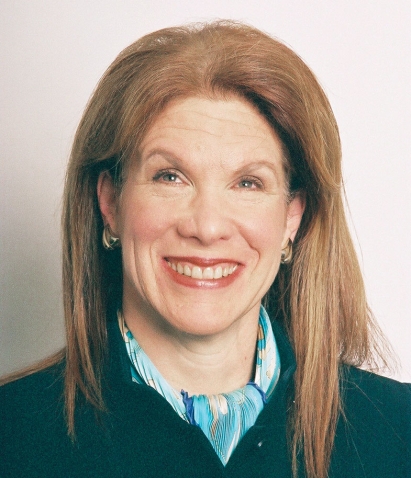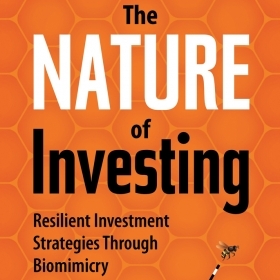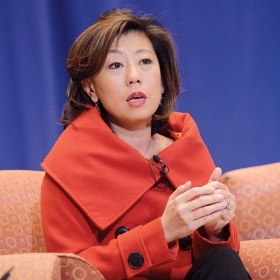Karen Dolmatch Petrou ’75 still remembers the exact words the Bank of America chief executive said to her in 1985. He “did not feel good about making a young woman a senior VP.” Karen was 32 at the time, and had risen quickly through the ranks at the bank. Instead of waiting around to see if he changed his mind, she quit and founded her own firm, Federal Financial Analytics.
Today, Karen is one of the world’s leading experts on bank regulation and policy. American Banker once described her as “the sharpest mind analyzing banking policy today—maybe ever.”
For years, she was one of the few women—if not the only woman—in meetings with bankers. She was also typically the only blind person in the room. Karen was diagnosed with retinitis pigmentosa as a teen, which left her mostly blind by her 40s. Ike, her dog, is always by her side, and she has gathered her near-encyclopedic knowledge of banking rules by listening to audio readings of legislation and research.
Karen’s experiences helped her notice what others often missed.
“Going blind is a life-changing experience. It’s quite possibly one of the reasons I’m so focused on economic inequality,” she says. “When you have a disability, it reminds you that life isn’t that easy and things happen.”
In early 2016, Karen gave a speech to central bankers laying out how the Federal Reserve’s low interest rate policies after the Great Recession had exacerbated inequality by causing stocks to soar and savers to suffer. A few months later, the election results triggered a lot of soul-searching among policymakers about the nation’s economic divides.
During the pandemic, the Federal Reserve has again been at the center of rescuing the U.S. economy and financial system from the worst recession since the 1930s. While many have praised the Fed for taking swift action as the pandemic hit, Karen warns that, once again, “the longer rates stay ultra-low, it’s not the economy that grows—it’s inequality.”
Her work has been widely cited by the media and Congress. While she is quick to acknowledge the Fed is not solely responsible for inequality, she urges swift change from the central bank. In early 2021, Karen published a book, Engine of Inequality: The Fed and the Future of Wealth in America, chronicling her deep concerns about what the central bank is doing. “The Fed has set the stage for another decade of weak growth, high-risk finance, low wages, negative savings, and lost hope,” she wrote.
At Wellesley, Karen majored in political science and says she was drawn to the College for its beauty, though she quickly learned the winters could be brutal. One of her most lasting memories of her college years is of a skiing class she took to fulfill the physical education requirement for graduation. She recalls a “miserable” time skiing down Severance Hill when it was “wet, muddy, and really cold.”
While at Wellesley, Karen took numerous classes at MIT, and she became an early expert on cable TV. She went to the University of California, Berkeley, for graduate school and was quick to understand the growing rise of technology and media. One of her talks caught the eye of Bank of America executives, who offered her a job as a “corporate political scientist.”
By far her favorite role, she says, has been leading Federal Financial Analytics in Washington, D.C., with her late husband, Basil, who urged her to bring her laptop along on their beach vacations to write her book. She and her husband had “always been our own bosses and able to do what we want.”







We ask that those who engage in Wellesley magazine's online community act with honesty, integrity, and respect. (Remember the honor code, alums?) We reserve the right to remove comments by impersonators or comments that are not civil and relevant to the subject at hand. By posting here, you are permitting Wellesley magazine to edit and republish your comment in all media. Please remember that all posts are public.